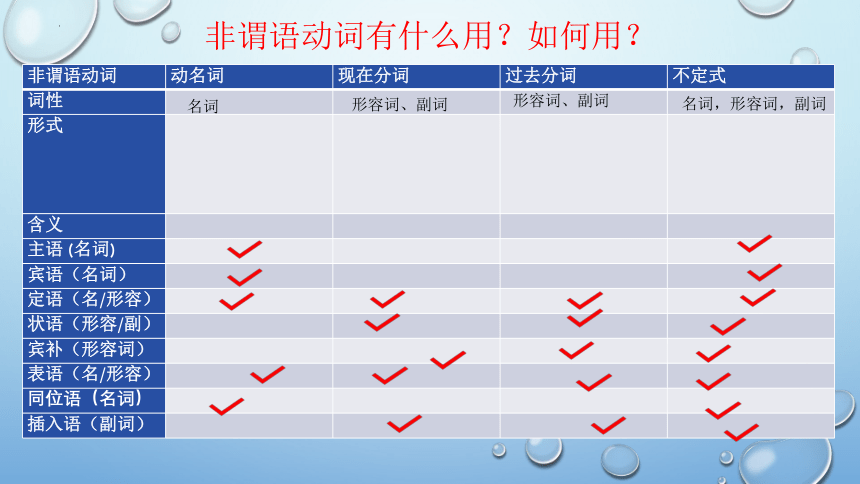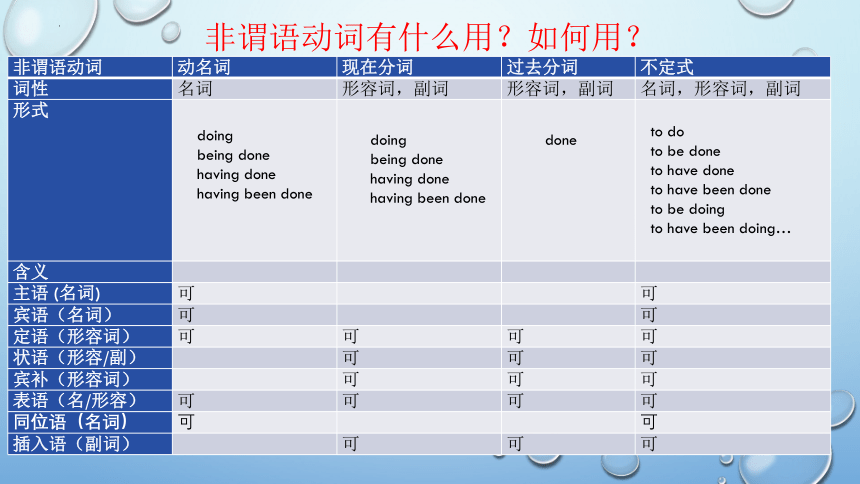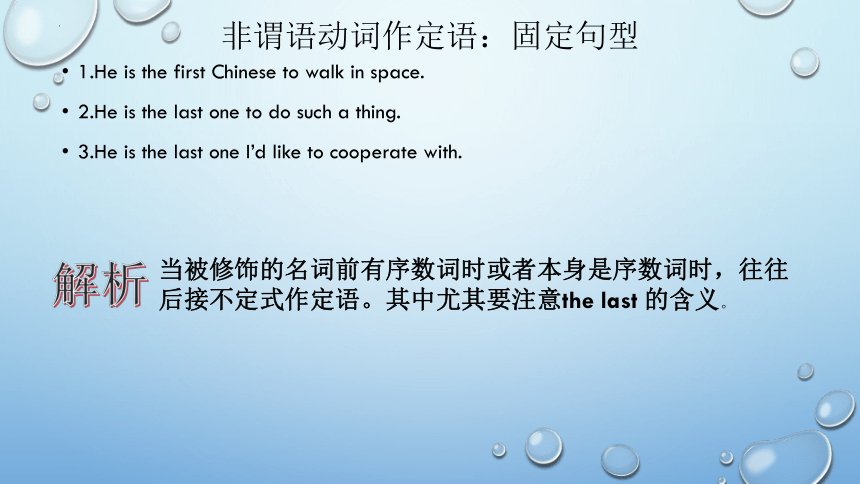2022届高考英语三轮冲刺非谓语动词课件27张PPT
文档属性
| 名称 | 2022届高考英语三轮冲刺非谓语动词课件27张PPT |  | |
| 格式 | zip | ||
| 文件大小 | 849.2KB | ||
| 资源类型 | 教案 | ||
| 版本资源 | 人教版(2019) | ||
| 科目 | 英语 | ||
| 更新时间 | 2022-05-26 22:11:40 | ||
图片预览









文档简介
(共27张PPT)
非谓语动词
句子的成分和及其词性
句子成分 主语 谓语 宾语 定语 表语 状语 表语 同位语 插入语
词性 名词 动词 名词 形容词、名词 形容词、名词 形容词、副词 名词、形容词 名词 副词
什么是谓语动词,什么叫做非谓语动词?
谓语
时态
语态
非谓语
-ing
-ed
to do
被动?
主动?
动词
动词专题:
非谓语动词有什么用?如何用?
非谓语动词 动名词 现在分词 过去分词 不定式
词性
形式
含义
主语 (名词)
宾语(名词)
定语(名/形容)
状语(形容/副)
宾补(形容词)
表语(名/形容)
同位语(名词)
插入语(副词)
名词
形容词、副词
形容词、副词
名词,形容词,副词
非谓语动词有什么用?如何用?
非谓语动词 动名词 现在分词 过去分词 不定式
词性 名词 形容词,副词 形容词,副词 名词,形容词,副词
形式
含义
主语 (名词) 可 可
宾语(名词) 可 可
定语(形容词) 可 可 可 可
状语(形容/副) 可 可 可
宾补(形容词) 可 可 可
表语(名/形容) 可 可 可 可
同位语(名词) 可 可
插入语(副词) 可 可 可
doing
being done
having done
having been done
doing
being done
having done
having been done
done
to do
to be done
to have done
to have been done
to be doing
to have been doing…
非谓语动词做定语(判断依据:被修饰的名词)
正在被讨论的问题
讨论过多次的问题
即将讨论的问题
讨论过的问题
已经交过作业的学生
正在做作业的学生
将要来帮助我们的学生
the problem being discussed
the problem having been discussed for many times
the problem to be discussed
the discussed problem
the students having handed in their homework
the students doing their homework
the students to come and help us
比较:They will come and help us.
非谓语动词作定语:固定句型
1.He is the first Chinese to walk in space.
2.He is the last one to do such a thing.
3.He is the last one I’d like to cooperate with.
当被修饰的名词前有序数词时或者本身是序数词时,往往 后接不定式作定语。其中尤其要注意the last 的含义。
解析
非谓语动词作定语:固定句型
4.The poor man had no room to live in.
5.The doctor has several patients to operate on every day.
6. He had no spade to dig a well with.
7.We have many courses to choose from.
当被修饰的名词表示工具或者是范围,亦或作定语的不定式的动词是不及物的,都需要注意加上适当的介词。
解析
非谓语动词作定语:固定句型
8.He has many clothes to be washed every day.
9. His mother has many clothes to wash every day.
10. With so much work to be done, the manager decided to hire more people to help.
11. With so much work to do, they had to work late into the night.
解析
不定式作定语时,如果主语是动作的执行者,则不定式用主动形式;反之,用被动。
非谓语动词做宾语补足语:依据宾语
我看见他们在公园的足球场踢球
我观看他们踢球直到比赛结束。
3. 我看见他们被老师批评了
I saw them playing football on the football field in the park
I watched them play football till the end of the match.
I saw them criticized by their teacher
非谓语动词做宾语补足语:
感官动词和使动词后接不定式做宾语补足语时,主动句中通常省略to,而被动句中则要加上to。
We often hear Jack sing English songs. 我们常听杰克唱英文歌。
变为被动语态: Jack is often heard to sing English songs.
He often makes his little sister cry, but sometimes he is made to cry by her.
非谓语动词做宾语补足语:使动词Have后面的宾语补足语
Have
Sb
sth
do
doing
done
doing
done
让某人做某事
让某人一直在做某事
容忍某人做某事
使某人被
容忍某人被
使某物一直在
听任某事做
让某事被做
容忍某事被做
遭遇到
非谓语动词做宾语补足语:使动词have的宾补
老师让李兰在毕业典礼上向所有学生发言
等车的时候,她的手机被偷了。
如果你容忍这样的事情发生,将来没有人会遵守规则了。
她爸爸是如此的生气以至于他让她面壁站了半小时。
没有家长能容忍自己的孩子被轻视。
我无法容忍你这样和老师说话。
夏天,学生们总是让空调从早到晚地工作着。
他发烧了,所有他妈妈让他在医院检查一下。
我明天上街去修电脑。
数学老师无法容忍这样的愚蠢的错误被一再地犯。
He had his left leg broken while he was playing football.
非谓语动词做宾语补足语:使动词have的宾补
老师让李兰在毕业典礼上向所有学生发言
The teacher had Li Lan make a speech/ address to all the students at the closing/ graduation ceremony.
等车的时候,她的手机被偷了。
While waiting for the bus, she had her mobile / cell phone stolen.
如果你容忍这样的事情发生,将来没有人会遵守规则了。
If you have such a thing happening, no one will obey rules in (the) future.
非谓语动词做宾语补足语:使动词have的宾补
她爸爸是如此的生气以至于他让她面壁站了半小时。
Her father was so angry that he had her standing towards the wall for half an hour.
没有家长能容忍自己的孩子被轻视。
No parents can have their children looked down upon。
我无法容忍你这样和老师说话。
I can't have you speaking to your teacher like that.
夏天,学生们总是让空调从早到晚地工作着.
In summer, my students are alwags having the air conditioners working from morning till night.
非谓语动词做宾语补足语:使动词have的宾补
他发烧了,所有他妈妈让他在医院检查一下。
He had got a fever, so his mother had him examined in the hospital.
我明天上街去修电脑。
I will have my coputer repaired in the sreet tomorrow.
数学老师无法容忍这样的愚蠢的错误被一再地犯。
The maths teacher can't have such a foolish mistake made again and again.
He had his left leg broken while he was playing football.
踢球的时候,他的左腿遭到骨折。
宾语补足语/主语补足语:固定句型
The book is easy to understand/ to be understood.
My hometown is hard to find/ to be found on the map.
The river is dangerous to be swum in/ to swim in.
Your red dress is pleasant to be looked at/ to look at.
轻、重、难、易、危险、安全、甜、苦、痛苦、开心、合适、不合适、等与感觉有关的形容词后面必须用不定式而且主动形式。Light, heavy, weighty, hard, difficult, easy, safe, dangerous, sweet, beautiful, ugly, pleasant, bitter, fit unfit
The medicine is bitter to take.
The box is heavy to carry.
宾语补足语/主语补足语:固定句型
It is said that he is studying abroad now.
It is said that he studied abroad once.
It is said that he will study abroad next year.
上述句子改成简单句:
He is said to be studying abroad now.
He is said to have studied abroad once.
He is said to study abroad the next year.
练习:
Charles Barbagge is said ---(invent) the first computer.
The first computer, ENIAC, is said ---(invent) in 1946.
据预测明天下午将有阵雨到了。
A shower is predicted to come tomorrow afternoon.
宾语补足语/主语补足语:固定句型
It
Seem/appear that
Chance/happen that
Is reported that
Is believed that
Is predicted that
Is thought that
Is said that
Is supposed that
Is assumed that
Is calculated that
Is likely that
Is possible that—sb is likely to do
非谓语动词做状语:以句子的主语作为判断的依据
See from the back, she is in very good shape.
See from the top of the mountain, she felt herself refreshed.
translate it, you need to improve your English.
Translate into Chinese, the book is popular among teenagers in China.
Heat to a certain temperature, water turns to vapor.
Heat water to a certain temperature, you can evaporate it.
非谓语动词作状语:以句子的主语作为判断的依据
Seen from the back, she is in very good shape.
Seeing from the top of the mountain, she felt herself refreshed.
To translate it, you need to improve your English.
Translated into Chinese, the book is popular among teenagers in China.
Heated to a certain temperature, water turns to vapor.
Heating water to a certain temperature, you can evaporate it.
非谓语动词做宾语:1,有些动词只能接不定式
决心学会有希望(decide/determine, learn, wish/hope),
同意计划莫假装(agree, plan, pretend),
胆敢拒绝会失败(dare, refuse, fail),
准备设法来帮忙(prepare, try/manage, help),
提供请求负担起(offer, beg/demand, afford),
答应安排理应当(promise, arrange, be supposed),
以上后跟不定式, 劝君牢记永不忘。
非谓语动词做宾语:2,有些动词只能接动名词
喜欢(enjoy)不断(keep)提建议(suggest)
盼望(look forward to)习惯(be used to)却完毕(finish)
想要(feel like)花费(spend)去练习(practice)
忍俊不禁(can’t help)还介意(mind)
My grandfather kept telling jokes and I couldn’t help laughing.
爷爷不停地讲笑话, 我忍不住笑了。
非谓语动词做宾语:3,有些动词两者皆可,含义不同
remember doing sth. 记得做过,remember to do sth. 记得去做(未做)
forget doing sth. 忘了做过某事,forget to do sth. 忘了去做某事(未做)
stop doing sth. 停止做某事,stop to do sth. 停下来去做某事
go on to do 接着去做另外一件事情,go on doing 继续做同一件事情
try to do 努力去做某事,try doing 尝试做某事
regret to do遗憾将要去做,regret doing 后悔做过某事
cannot help doing情不自禁做某事,cannot help (to)do无法帮忙做某事
非谓语动词做宾语:4,有些动词两者皆可,含义相同
Need doing=need to be done
Want to be done=want doing
Require doing =require to be done
Begin/start to do/doing
Continue doing/to do
Bear to do /doing
非谓语动词作表语:依据主语
我的工作是教英语。
My job is teaching English.
他的愿望是上一所好大学。
His wish is to go to a good college。
这本小说太有趣了。
the novel is too interesting.
大家被小说中的人物深深的感动了。
All of them were deeply moved by the characters in the novel.
非谓语动词总结
非谓语动词
句子的成分和及其词性
句子成分 主语 谓语 宾语 定语 表语 状语 表语 同位语 插入语
词性 名词 动词 名词 形容词、名词 形容词、名词 形容词、副词 名词、形容词 名词 副词
什么是谓语动词,什么叫做非谓语动词?
谓语
时态
语态
非谓语
-ing
-ed
to do
被动?
主动?
动词
动词专题:
非谓语动词有什么用?如何用?
非谓语动词 动名词 现在分词 过去分词 不定式
词性
形式
含义
主语 (名词)
宾语(名词)
定语(名/形容)
状语(形容/副)
宾补(形容词)
表语(名/形容)
同位语(名词)
插入语(副词)
名词
形容词、副词
形容词、副词
名词,形容词,副词
非谓语动词有什么用?如何用?
非谓语动词 动名词 现在分词 过去分词 不定式
词性 名词 形容词,副词 形容词,副词 名词,形容词,副词
形式
含义
主语 (名词) 可 可
宾语(名词) 可 可
定语(形容词) 可 可 可 可
状语(形容/副) 可 可 可
宾补(形容词) 可 可 可
表语(名/形容) 可 可 可 可
同位语(名词) 可 可
插入语(副词) 可 可 可
doing
being done
having done
having been done
doing
being done
having done
having been done
done
to do
to be done
to have done
to have been done
to be doing
to have been doing…
非谓语动词做定语(判断依据:被修饰的名词)
正在被讨论的问题
讨论过多次的问题
即将讨论的问题
讨论过的问题
已经交过作业的学生
正在做作业的学生
将要来帮助我们的学生
the problem being discussed
the problem having been discussed for many times
the problem to be discussed
the discussed problem
the students having handed in their homework
the students doing their homework
the students to come and help us
比较:They will come and help us.
非谓语动词作定语:固定句型
1.He is the first Chinese to walk in space.
2.He is the last one to do such a thing.
3.He is the last one I’d like to cooperate with.
当被修饰的名词前有序数词时或者本身是序数词时,往往 后接不定式作定语。其中尤其要注意the last 的含义。
解析
非谓语动词作定语:固定句型
4.The poor man had no room to live in.
5.The doctor has several patients to operate on every day.
6. He had no spade to dig a well with.
7.We have many courses to choose from.
当被修饰的名词表示工具或者是范围,亦或作定语的不定式的动词是不及物的,都需要注意加上适当的介词。
解析
非谓语动词作定语:固定句型
8.He has many clothes to be washed every day.
9. His mother has many clothes to wash every day.
10. With so much work to be done, the manager decided to hire more people to help.
11. With so much work to do, they had to work late into the night.
解析
不定式作定语时,如果主语是动作的执行者,则不定式用主动形式;反之,用被动。
非谓语动词做宾语补足语:依据宾语
我看见他们在公园的足球场踢球
我观看他们踢球直到比赛结束。
3. 我看见他们被老师批评了
I saw them playing football on the football field in the park
I watched them play football till the end of the match.
I saw them criticized by their teacher
非谓语动词做宾语补足语:
感官动词和使动词后接不定式做宾语补足语时,主动句中通常省略to,而被动句中则要加上to。
We often hear Jack sing English songs. 我们常听杰克唱英文歌。
变为被动语态: Jack is often heard to sing English songs.
He often makes his little sister cry, but sometimes he is made to cry by her.
非谓语动词做宾语补足语:使动词Have后面的宾语补足语
Have
Sb
sth
do
doing
done
doing
done
让某人做某事
让某人一直在做某事
容忍某人做某事
使某人被
容忍某人被
使某物一直在
听任某事做
让某事被做
容忍某事被做
遭遇到
非谓语动词做宾语补足语:使动词have的宾补
老师让李兰在毕业典礼上向所有学生发言
等车的时候,她的手机被偷了。
如果你容忍这样的事情发生,将来没有人会遵守规则了。
她爸爸是如此的生气以至于他让她面壁站了半小时。
没有家长能容忍自己的孩子被轻视。
我无法容忍你这样和老师说话。
夏天,学生们总是让空调从早到晚地工作着。
他发烧了,所有他妈妈让他在医院检查一下。
我明天上街去修电脑。
数学老师无法容忍这样的愚蠢的错误被一再地犯。
He had his left leg broken while he was playing football.
非谓语动词做宾语补足语:使动词have的宾补
老师让李兰在毕业典礼上向所有学生发言
The teacher had Li Lan make a speech/ address to all the students at the closing/ graduation ceremony.
等车的时候,她的手机被偷了。
While waiting for the bus, she had her mobile / cell phone stolen.
如果你容忍这样的事情发生,将来没有人会遵守规则了。
If you have such a thing happening, no one will obey rules in (the) future.
非谓语动词做宾语补足语:使动词have的宾补
她爸爸是如此的生气以至于他让她面壁站了半小时。
Her father was so angry that he had her standing towards the wall for half an hour.
没有家长能容忍自己的孩子被轻视。
No parents can have their children looked down upon。
我无法容忍你这样和老师说话。
I can't have you speaking to your teacher like that.
夏天,学生们总是让空调从早到晚地工作着.
In summer, my students are alwags having the air conditioners working from morning till night.
非谓语动词做宾语补足语:使动词have的宾补
他发烧了,所有他妈妈让他在医院检查一下。
He had got a fever, so his mother had him examined in the hospital.
我明天上街去修电脑。
I will have my coputer repaired in the sreet tomorrow.
数学老师无法容忍这样的愚蠢的错误被一再地犯。
The maths teacher can't have such a foolish mistake made again and again.
He had his left leg broken while he was playing football.
踢球的时候,他的左腿遭到骨折。
宾语补足语/主语补足语:固定句型
The book is easy to understand/ to be understood.
My hometown is hard to find/ to be found on the map.
The river is dangerous to be swum in/ to swim in.
Your red dress is pleasant to be looked at/ to look at.
轻、重、难、易、危险、安全、甜、苦、痛苦、开心、合适、不合适、等与感觉有关的形容词后面必须用不定式而且主动形式。Light, heavy, weighty, hard, difficult, easy, safe, dangerous, sweet, beautiful, ugly, pleasant, bitter, fit unfit
The medicine is bitter to take.
The box is heavy to carry.
宾语补足语/主语补足语:固定句型
It is said that he is studying abroad now.
It is said that he studied abroad once.
It is said that he will study abroad next year.
上述句子改成简单句:
He is said to be studying abroad now.
He is said to have studied abroad once.
He is said to study abroad the next year.
练习:
Charles Barbagge is said ---(invent) the first computer.
The first computer, ENIAC, is said ---(invent) in 1946.
据预测明天下午将有阵雨到了。
A shower is predicted to come tomorrow afternoon.
宾语补足语/主语补足语:固定句型
It
Seem/appear that
Chance/happen that
Is reported that
Is believed that
Is predicted that
Is thought that
Is said that
Is supposed that
Is assumed that
Is calculated that
Is likely that
Is possible that—sb is likely to do
非谓语动词做状语:以句子的主语作为判断的依据
See from the back, she is in very good shape.
See from the top of the mountain, she felt herself refreshed.
translate it, you need to improve your English.
Translate into Chinese, the book is popular among teenagers in China.
Heat to a certain temperature, water turns to vapor.
Heat water to a certain temperature, you can evaporate it.
非谓语动词作状语:以句子的主语作为判断的依据
Seen from the back, she is in very good shape.
Seeing from the top of the mountain, she felt herself refreshed.
To translate it, you need to improve your English.
Translated into Chinese, the book is popular among teenagers in China.
Heated to a certain temperature, water turns to vapor.
Heating water to a certain temperature, you can evaporate it.
非谓语动词做宾语:1,有些动词只能接不定式
决心学会有希望(decide/determine, learn, wish/hope),
同意计划莫假装(agree, plan, pretend),
胆敢拒绝会失败(dare, refuse, fail),
准备设法来帮忙(prepare, try/manage, help),
提供请求负担起(offer, beg/demand, afford),
答应安排理应当(promise, arrange, be supposed),
以上后跟不定式, 劝君牢记永不忘。
非谓语动词做宾语:2,有些动词只能接动名词
喜欢(enjoy)不断(keep)提建议(suggest)
盼望(look forward to)习惯(be used to)却完毕(finish)
想要(feel like)花费(spend)去练习(practice)
忍俊不禁(can’t help)还介意(mind)
My grandfather kept telling jokes and I couldn’t help laughing.
爷爷不停地讲笑话, 我忍不住笑了。
非谓语动词做宾语:3,有些动词两者皆可,含义不同
remember doing sth. 记得做过,remember to do sth. 记得去做(未做)
forget doing sth. 忘了做过某事,forget to do sth. 忘了去做某事(未做)
stop doing sth. 停止做某事,stop to do sth. 停下来去做某事
go on to do 接着去做另外一件事情,go on doing 继续做同一件事情
try to do 努力去做某事,try doing 尝试做某事
regret to do遗憾将要去做,regret doing 后悔做过某事
cannot help doing情不自禁做某事,cannot help (to)do无法帮忙做某事
非谓语动词做宾语:4,有些动词两者皆可,含义相同
Need doing=need to be done
Want to be done=want doing
Require doing =require to be done
Begin/start to do/doing
Continue doing/to do
Bear to do /doing
非谓语动词作表语:依据主语
我的工作是教英语。
My job is teaching English.
他的愿望是上一所好大学。
His wish is to go to a good college。
这本小说太有趣了。
the novel is too interesting.
大家被小说中的人物深深的感动了。
All of them were deeply moved by the characters in the novel.
非谓语动词总结
同课章节目录
